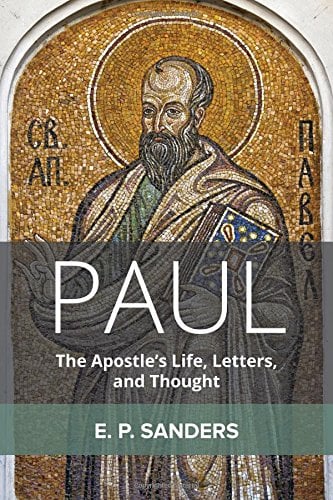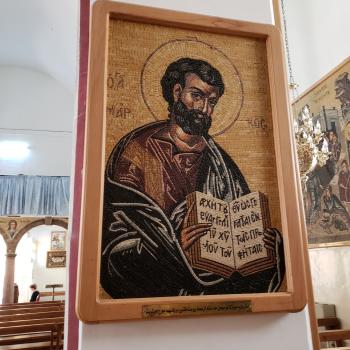p. 175— The M.O. for each following chapter will be: 1) explain the form of the letter; 2) reconstruct the sequence of events which led up to the letter; 3) identify the presuppositions of the letter; 4) listing Paul’s standard views and presuppositions which will let the individuality of each letter stand out.
p. 176— all Paul’s letters have the same basic parts except Galatians which is missing the thanksgiving: 1) addressor and colleagues and addressees; 2) opening benediction; 3) thanksgiving which always provides a preview of coming contents; 4) the body, in the case of 1 Thess. 2.1-5.11; 5) closing admonitions 5.12-13; 6) concluding benediction 5.23-28. All of Paul’s letters except Romans [also Colossians] are part of a continuing conversation hence the need to reconstruct the history of Paul’s relationship with the audience.
p. 177— 1) the founding visit— 1 Thess. 1.5-10;2.1-13; 2) Paul had learned the Thessalonians were suffering (2.14) and he had long wished to visit (2.17-18); 3) Paul sent Timothy to encourage them fearing their faith was shaken (3.1-5); 4) Timothy reported back that all was well (3.6-8); but 4) Paul kept worrying (3.10), so then Paul wrote and sent 1 Thess. we don’t know who delivered it.
p. 178 one must distinguish between what is specific and what is general, the latter being things Paul frequently says in the letters, but are not situation specific. He divides Paul’s statements in the letter into 1) those that are doubtless of specific importance in 1 Thess; 2) those that are probably situation specific; 3) those that are possibly situation specific, and 4) those which are standard or general.
p. 179— From 1 Thess. 1.9-10 we learn: 1) the converts were pagans, converting from the worship of Greco-Roman gods; 2) they had converted by turning from idols and turning to the God of Israel; 3) as part of their conversion they accepted Jesus as God’s Son; 4) they thought Jesus would return soon; 5) they thought this meant God’s wrath and judgment would soon visit the world; 6) Paul had taught them and they believed that accepting the true God and his Son they would be saved from the wrath to come. Points 4-6 are further supported by 4.16, 5.2, 5.9.
p. 180-81— From 1 Thess. 1.6-3.4 we learn Jesus and the earlier prophets had been killed, Jewish Christians in Judea had been persecuted by non-Christian Jews there, that Paul was persecuted on the mission field, specifically in Philippi (see 2.2 and 2.16), from which we may conclude that some local Jews in some cities made trouble for Paul when he preached there. Sanders translates 1.6 which says the Thess. had become ‘imitators of us and of the Lord for in persecution they received the Word with joy inspired by the H. Spirit.’ After the Thess. accepted Paul’s message, they were persecuted by unconverted Gentiles. Paul construes there and his own suffering as imitation of Christ and the Christians in Judaea. 1 Thess. is sent to ‘restore whatever was lacking in their faith.’ (1 Thess. 3.5-10).
p. 181— From 1 Thess. 4.13-18 Sanders deduces that Paul had not told them that if they died before the return of Christ they would still be saved. So his initial message was believe in Christ and when he returns you’ll be saved, rather than believe in Christ and when you die you will be saved. Here it is clear says Sanders, that Paul thought Christ would return very soon.[See the critique of this view in subsequent posts].
p. 182— He thinks 4.11-12 and 5.14 tells us that Timothy had told Paul that some of the Thess. had stopped working, and were begging or being dependent on others. Sanders assumes the stopped working is because of imminence of the return. Possibly situation specific is 2.3-12 where Paul defends himself against the charges of greed, trickery, deceit. Maybe someone there had accused Paul of this after he left, but this may reflect a more general complaint against Paul, or he had heard this was true of other missionaries, or he was just hyper-sensitive on these issues dealing with money and motives. He finds it puzzling that Paul is defensive here when he is still on good terms with the Thess. Maybe his mentioning his working was to motivate some of them to keep working. 1 Thess. 4.1-8 may be a general reminder about sexual ethics or may deal with a more specific problem but the phrase ‘as you are already doing’ suggests the former. 5.12-13 indicates there are local leaders and they should be respected.
p. 184-85— habitual or standard views—Spirit is active in the congregation, and inspires prophecy (5.19-20). Paul assumes existence of Satan as well as God—1.1-5, 2.18. Paul assumes both God’s control over human lives and also that humans were responsible for their decisions. Both/and which was a common view in antiquity. He says almost everyone assumed both is true. Command to love one another in 4.9-10. Salvation applies to both the living and the dead 4.14-16;5.10; people should work and not be idle (5.14; 4.11-12). The end is near so we must be prepared (5.1-11). The Lord will return without advance warning. People should live in peace and not repay evil for evil (5.12-24). 1 Thess. 1.7-9 indicates others in the region have heard of their conversion, Paul does not refer to the Thess. converts evangelizing. Apparently that is left to the apostles. Local leaders and local prophets should guide the local church. The apostles are the church planters (p. 185).
p. 189— Paul’s basic Gospel is simple. But what is complicated is his mode of argumentation especially when he is fending off attacks, and it is Jewish mode of argumentation.
p. 190— it was the turning from idols that led to persecution.
p. 192— Two key words that do show up in 1 Thess. are words with the pist—root (faith, believe, trust) and words with the dikai—root (righteous, righteousness, justify).
p. 193— “The principle point of this exercise is to show what has not yet happened: ‘faith’ and ‘righteousness’ and their cognates are used in 1 Thessalonians in very ordinary ways: fidelity, trust, trustworthiness, lack of doubt, and holding a firm conviction are meanings of ‘faith’…and ‘uprightly’ is the only example of ‘righteousness’ [2.10—justly language]… The two words are not closely connected (as in ‘righteousness by faith’). They do not yet carry the special significance and meanings that they will acquire in Galatians, Philippians, and Romans, where they are terms by which Paul sets his gospel over against that of some of his opponents.”

















